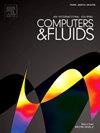量子碰撞电路,量子不变量和流体动力点阵气体自动机的量子相位估计程序
IF 2.5
3区 工程技术
Q3 COMPUTER SCIENCE, INTERDISCIPLINARY APPLICATIONS
引用次数: 0
摘要
点阵气体元胞自动机(LGCA)是一种经典的数值方法,被广泛应用于模拟多种物理现象。在本文中,我们使用计算基编码(CBE)研究了LGCA在量子计算机(QC)上的翻译,开发了不同目的的方法。特别是,我们澄清和讨论了使用CBE和量子行走作为流过程的一些基本限制和优点。利用量子行走影响量子正交态中经典态的可能编码、与碰撞的统一性和获得量子优势的可能性相关的特征。然后,基于该模型的经典特征,给出了优化碰撞量子电路的有效方法。这是专门适用于流体动力学LGCA。同时,提出了一种新的一维模型碰撞电路。我们解决了LGCA中不变量的重要问题,提供了一种方法来找到在它们的QC公式中出现了多少不变量。量子不变量的数量超过了经典的预期,证明了进一步研究的必要性。最后,我们证明了一种基于量子相位估计(QPE)的检索任意数量感兴趣的方法的有效性。本文章由计算机程序翻译,如有差异,请以英文原文为准。
Quantum collision circuit, quantum invariants and quantum phase estimation procedure for fluid dynamic lattice gas automata
Lattice Gas Cellular Automata (LGCA) is a classical numerical method widely known and applied to simulate several physical phenomena. In this paper, we study the translation of LGCA on quantum computers (QC) using computational basis encoding (CBE), developing methods for different purposes. In particular, we clarify and discuss some fundamental limitations and advantages in using CBE and quantum walk as streaming procedure. Using quantum walks affect the possible encoding of classical states in quantum orthogonal states, feature linked to the unitarity of collision and to the possibility of getting a quantum advantage. Then, we give efficient procedures for optimizing collisional quantum circuits, based on the classical features of the model. This is applied specifically to fluid dynamic LGCA. Alongside, a new collision circuit for a 1-dimensional model is proposed. We address the important point of invariants in LGCA providing a method for finding how many invariants appear in their QC formulation. Quantum invariants outnumber the classical expectations, proving the necessity of further research. Lastly, we prove the validity of a method for retrieving any quantity of interest based on quantum phase estimation (QPE).
求助全文
通过发布文献求助,成功后即可免费获取论文全文。
去求助
来源期刊

Computers & Fluids
物理-计算机:跨学科应用
CiteScore
5.30
自引率
7.10%
发文量
242
审稿时长
10.8 months
期刊介绍:
Computers & Fluids is multidisciplinary. The term ''fluid'' is interpreted in the broadest sense. Hydro- and aerodynamics, high-speed and physical gas dynamics, turbulence and flow stability, multiphase flow, rheology, tribology and fluid-structure interaction are all of interest, provided that computer technique plays a significant role in the associated studies or design methodology.
 求助内容:
求助内容: 应助结果提醒方式:
应助结果提醒方式:


